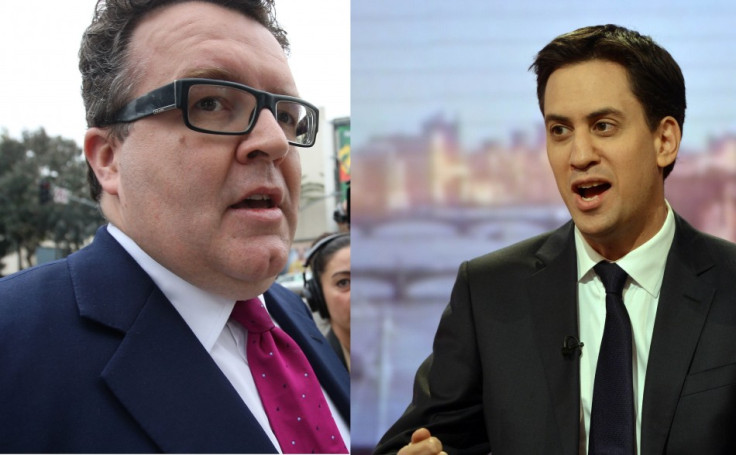Tom Watson Warns Ed Miliband: Your Union Reforms Could Screw up Election Win

Labour leader Ed Miliband's former elections organiser has warned that the party is in danger of "screwing up" its chances of winning the general election in 2015 over planned reforms to its relationship with the unions.
Tom Watson said it would be dangerous to believe that Labour's 10-point poll lead would necessarily mean victory at the election.
"Ed has held the Labour party together through very rocky times and we are in a position to win the election because of his leadership, but we have got to be careful we don't screw up," he told IBTimes UK.
He said that Labour did not want to make the old mistake of looking inward and becoming obsessed by party wrangling, which puts voters off.
Asked if that could include the way Miliband handled relations with the unions he declared: "I genuinely don't know where it's going to go, but I am worried about it, yes. Usually you reform a party after an election, not in the run-up to it. That is where the danger lies."
Speaking during a wide-ranging interview with IB Times UK, Watson said he would like to see "uncivilised" employers such as McDonald's paying a living wage in return for a cut in corporation tax.
He urged Miliband to announce support for an In-Out referendum on the EU to take place on the day of the next European elections in May.
And he said the time had come for reforms of the voting system to allow smaller parties into parliament to overcome the "compression" of politics on to the centre ground.
Watson stood down from his role as Miliband's elections coordinator in July after the row over the Falkirk selection, where his office manager was the union's choice for the seat. In the immediate wake of the row, Miliband announced there would be reform of the way unions helped fund Labour through donations but stood accused of making up policy on the hoof.
Watson said that he had been taken by surprise by the announcement.
"I didn't know it was coming. I don't know if the plans were in the back of his mind and he brought them forward or whether he did it on the spur of the moment," he said.
His great fear was that unions "knew where the planned reforms were going" and that was leading them into "disengaging" from the Labour party. The GMB's recent decision to cut its funding to Labour by £1m was one result.
"I am not anti-reform but I was taken aback at the narrow scope of the announcement on reform.
"I don't want to second-guess why the decision was made because it wouldn't be fair. But there are no proposals on the table, just an announcement on broad areas. The direction of travel seems to be for quite narrow reform."
Watson also made it plain that he intended to use his new position outside the shadow cabinet to outline his own policy ideas, for example on low wages. He cited McDonald's use of zero-hours contracts, where workers would be told to turn up in the morning only then to be told to go home because they were not needed, and would not be paid.
"That is totally uncivilised, it is an abuse of contract law. The state probably subsidises them to the tune of £200m a year through family tax credits because they pay such low wages. But they also pay corporation taxes. If you can find a formula that says we will reduce your corporation taxes if you have civilised employment practices, that is modern social democracy at work.
"These are the kinds of solutions I would like the Labour party to consider," he said.
Time for EU referendum
He added that Labour needed to announce a "clear position" in favour of a pre-election referendum on Britain's place in Europe.
"There is no point hanging around," he said. "The time has come for a referendum and it should be on the day of the European elections next May when there is a better chance of having a proper, informed debate about Europe."
He said he had gradually come to the conclusion that the only way to open up British democracy was through electoral reform that would allow more, smaller, parties into parliament.
"I don't think the parties have it within themselves to change and be more open, and there is always a demand for media management around moderate positions which means other voices are excluded."
He insisted that he believed Labour, under Miliband's leadership, could win the next election but declared that, if the country again landed with a hung parliament, the party should not rule out a deal with the Liberal Democrats.
"That is not desirable and not some sort of Nirvana for people on the left. But we could work with their progressive forces.
"Probably not with Nick Clegg, though."
© Copyright IBTimes 2024. All rights reserved.






